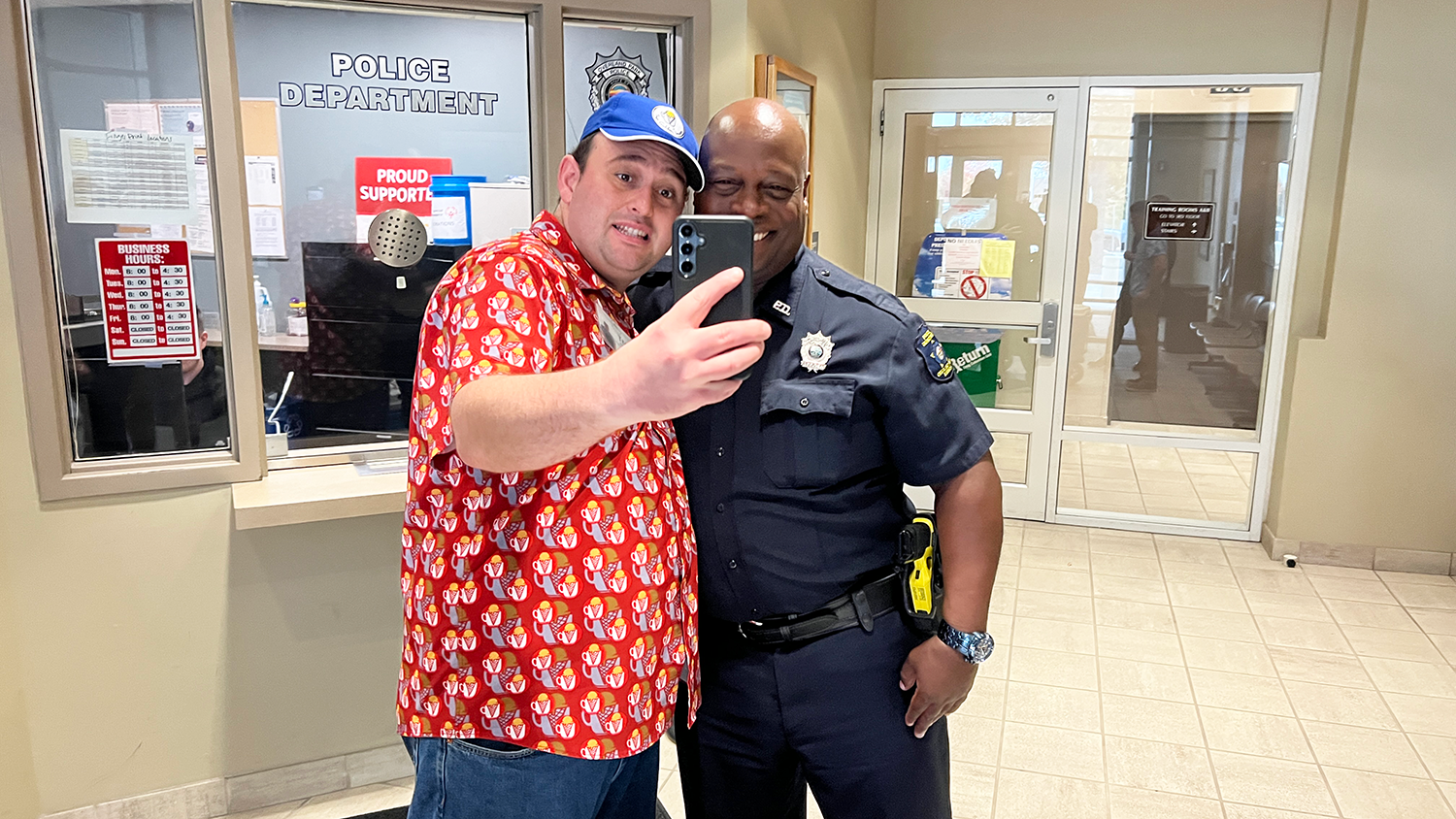Police Transparency
Police Transparency
The Overland Park Police Department serves the community with integrity by treating every individual with whom we interact fairly, lawfully and professionally. Our department prides itself on accountability and transparency to ensure responsible use of resources and open communication.
This page includes information, links and policies that openly define our processes, philosophies and accountability measures that ensure we provide the best service possible.
In most cases, links to policies and procedures will direct you to a library of all Overland Park Police Department Standards of Conduct and Standard Operating Procedures.



Anti-Biased Policing
Racial or other biased-based policing is unethical, unlawful and unacceptable. It fosters community distrust of law enforcement and it will not be tolerated or condoned by any Police Department staff member. The Overland Park Police Department is committed to non-biased policing.
Officers and other Police Department staff are required to report any incidents of biased-based policing to their supervisors. Supervisors are responsible for maintaining awareness for actions, patterns or practices of possible discriminatory treatment, to include reviewing complaints and reports and analyzing traffic and pedestrian stop data.
- Training
- Filing a Complaint
- Reporting + Resolution
- Related Policies
Arrest Data by Demographic
The City of Overland Park is a destination for not only residents, but visitors, workers, students, and others. More than five million people visit our city every year, and more than 100,000 people commute into Overland Park every day from throughout and outside the metropolitan Kansas City area.
While the population demographics in the tables below are based on Census groups, Overland Park Police Department services are available to all who are in our city, no matter how long they stay.
The figures below are for 2023. Community and metropolitan demographic data is from the US Census Bureau American Community Survey, 2022.
- 2023 Arrests by Race
- 2023 Arrests by Sex
- 2023 Arrests by Age
- Related Policies
Body-Worn Cameras
All 280 commissioned officers are issued a body-worn camera and are required to wear the camera while in uniform. This includes officers working in patrol, community policing, school resource, traffic and emergency services.
Body camera and dash camera footage may be disclosed in accordance with Kansas state statute.
- Department Use
- Related Policies
Budget
The Overland Park Police Department’s budget is part of the City of Overland Park’s overall annual budget.
- Police Department Budget
- Related Policies + Links
CALEA Accreditation
The Overland Park Police Department first earned accreditation from the Commission on Accreditation for Law Enforcement Agencies in 2018 and has maintained compliance and accreditation each year after that. The department was recognized with re-accreditation in 2022.
- What is CALEA?
- Accreditation Process
- Related Policies
Calls for Service Log
To provide transparency into ongoing daily police operations, the Overland Park Police Department posts its calls for service in near-real-time on the City’s website. To protect privacy, the last two numbers in addresses are replaced with the letter “X”, and sensitive call types are not included. The information displayed is based on the information callers provide to dispatch. It may not reflect the outcome of the investigation.
Community Engagement
The Overland Park Police Department invites the community to be involved in policing and get to know our officers and staff.
There are a variety of ways for residents, visitors and others to engage with the department.
- Community Police Academy
- Accreditation Meetings
- Ride-Alongs
- Coffee with a Cop
- National Night Out
- Explorer Program
- School Resource Officers
- Police Station Tours
- Police Department Social Media
- Crime Prevention Presentations
- Security Surveys
- Boards, Commissions + Committees
- Governing Body Meetings
Compliments + Complaints
Overland Park Police staff work to provide professional services and compassionate support to everyone we encounter. Staff are expected to manifest the City’s core values of integrity, service commitment, respect, stewardship, relationship building and pursuit of excellence in the work we do.
There are high expectations for all who work within the Overland Park Police Department, and we welcome your feedback. Please visit the Compliments + Complaints page to learn more about these processes.
- Filing a Complaint
- Investigation Process
- Related Policies
Crime Mapping
The Overland Park Police Department partners with many local police departments to share crime data on the Community Crime Map.
Because Overland Park is a significant part of the Kansas City metropolitan area and Johnson County, it is beneficial to review crime data comprehensively across the region.
The Community Crime Map also connects law enforcement with the community to reduce crime and improve public safety.
Crime mapping helps members of the public get a better idea of the crime activity in their area so they can make more informed decisions about how to stay safe.
The Community Crime Map goes beyond crime mapping by automatically alerting the public about recent crime activity and by improving communication between the public and law enforcement through anonymous tips.
Community Crime Map empowers the public to make better decisions about crime by putting the same technology used by law enforcement to analyze and interpret crime activity into the hands of the public.
Cultural Humility
The Overland Park Police Department strives to learn about and be a part of the variety of groups within the community we serve and how we can better offer our services in a culturally appropriate way.
- Community Partners
- Related Policies
De-Escalation + Response to Resistance
The use of force in law enforcement is an issue of critical concern nationally, in the Overland Park community and among law enforcement.
Whenever possible and appropriate, an Overland Park Police officer’s first step is to de-escalate a situation. If that is not possible, officers may use the degree of control or force reasonably necessary to ensure a safe outcome.
Our officers are required to report all use of force. These reports are analyzed at the department level as well as provided to the FBI for public reporting purposes on its Crime Data Explorer tool.
- De-Escalation
- Oversight
- Related Policies
Diversity
The Overland Park Police Department values diversity and the perspectives diversity brings to the community and our operations. Our department strives to mirror the demographics of the community we serve. The information below provides a snapshot of our representation as compared to the Overland Park community. Information presented below includes Overland Park Police Department Data as of May 10, 2024.
- Police Department By Race
- Police Department by Sex
- Police Department by Age
- 30x30 Campaign
- Related Policies
Ethics
All Overland Park police officers agree to follow a code of ethics when they take their oath of honor. This code provides fundamental guidance for employees and the expectations of conduct and duty performance for all members of the Overland Park Police Department.
- Code of Ethics
- Related Policies
Trust Building Campaign
The Overland Park Police Department is pleased to announce the completion of a pledge to enhance trust, accountability and collaboration between police and the community it protects and serves.
Developed by the International Association of Chiefs of Police (IACP), the pledge is part of the Trust Building Campaign initiative. To join the Trust Building Campaign, law enforcement agencies must pledge to implement 25 key policies and practices within 36 months. The Overland Park Police Department earned its certification in August 2023.
By completing the Trust Building Campaign Pledge, the Overland Park Police presented their established policies and trainings, conducted assessments and developed strategies within six focus areas:
- Bias-free policing,
- Use of force,
- Leadership and culture,
- Recruitment and retention,
- Victim services,
- And community relations.
These policies are designed to encourage positive community-police partnerships that promote safe, effective interactions and create strategies to prevent and reduce crime.
The IACP is encouraged by agencies’ efforts as they incorporate the pledge’s concepts into everyday operations. When trust building is prioritized, community members and police benefit from relationships focused on unified visions, goals and values.
Find more information about the Trust Building Campaign on the IACP’s website.
Active Bystandership for Law Enforcement (ABLE)
The Overland Park Police Department began an effort to implement ABLE in 2022 and was accepted into this program in 2023. To be accepted, the police department received a letter from two community-based organizations (NAACP and El-Centro) vouching for the sincerity of the agency’s interest in self-improvement in general and ABLE in particular, as well as a letter of support from Mayor Curt Skoog.
ABLE enables a culture of transparency and accountability in law enforcement organizations to create an environment where officers routinely intervene as necessary to prevent misconduct, avoid police mistakes and promote officer health and wellness.
Police department leadership carefully selected a diverse group of instructors from all levels of the organization to become trainers, who must follow strict guidelines and updated curriculum. The first round of eight-hour training for all members began in 2024, with annual training already being planned.
More information about this initiative can be found on the Georgetown Law website and the USDOJ website. Overland Park is currently only one of four Kansas law enforcement agencies that have made the commitment to ABLE.
Benefits of ABLE Intervention
Reduces:
- Complaints
- Disciplinary action and officer job loss
- Risk of lawsuits
- Unnecessary harm to civilians and officers
Improves:
- Community’s support of law enforcement
- Community/police relations
- Job satisfaction
- Officer health and wellness
Hiring Process + Standards
The Overland Park Police Department’s diligent hiring process ensures our officers uphold City values of integrity, service commitment, respect, stewardship, relationship building and pursuit of excellence. In addition to the requirements and process below, we look for candidates with a heart for service, a drive to excel in an organization full of opportunities, and a desire to become part of something bigger than themselves – the Overland Park community.
- Hiring Requirements
- Selection Process
- Related Policies
Mental Health Services
Overland Park Police Department officers train annually on best practices for helping members of the public in crisis and strive to provide services that keep all people safe during interactions with people with mental illnesses.
- Overland Park Crisis Action Team
- CIT Training
- Related Policies + Resources
Officer Wellness
The Overland Park Police Department is committed to providing officers with the appropriate resources and support during their day-to-day operations, and especially following a critical, unusual, or extreme event. Caring for our staff in this way not only promotes safer policing but creates better working environments for our teams and assists with their return to routine functioning.
- Employee Assistance Program
- Peer Support Program
- Police Chaplains
- Department Psychologist
- Physical Fitness
- Law Enforcement Mental Health and Awareness Grant
- Related Policies
Police Reform Alignment
The Police Department understands there are calls nationally for police and criminal justice reform. The information below includes the Overland Park Police Department’s response and alignment to individual reform recommendations.
- Governor’s Commission on Racial Equity and Justice
- 8 Can't Wait
- Municipal Equality Index
- Related Policies
School Resource Officers
Overland Park school resource officers are sworn members of the Police Department who serve in middle and high schools in the city. They work in conjunction with school administration, security staff, and teachers to ensure a safe learning environment for everyone.
- Training
- Role + Duties
- Related Policies
Training
Training is ongoing throughout the career of Overland Park Police Department staff members. Our training program consists of initial training, in-service training, and other ongoing professional development training opportunities.
- Initial Training
- In-Service Training
- Ongoing Professional Development Training
- Related Policies
Standards of Conduct + Standard Operating Procedures
In order for our practices to be as transparent as possible, the Overland Park Police Department provides online access to department policies and procedures.
These written standards and policies are just the beginning of the education, training and development our staff receive. While it is not possible to anticipate every situation that may arise or prescribe a course of action for all scenarios these policies serve as guidance and requirements to direct officers’ actions.
Police Department Standards of Conduct + Standard Operating Procedures
- Standards of Conduct
- Standard Operating Procedures
Law Enforcement Trust Fund
State and federal laws authorize the Overland Park Police Department to seize certain property related to criminal activity. Property may be seized to remove crime tools from criminal groups, take away illegal profits, help compensate victims and deter further crime.
Kansas law governs how assets are seized in state-level cases, with the process managed by the District Attorney or City Attorney. The federal government handles assets seized for federal-level criminal investigations when the Overland Park Police Department is involved in the investigation. Property owners have rights and due process in court before any property can be awarded to the department.
Any assets awarded to the Police Department are strictly used for law enforcement purposes and are subject to reporting, purchasing and audit regulations.
Quarterly and annual reports are available below.
